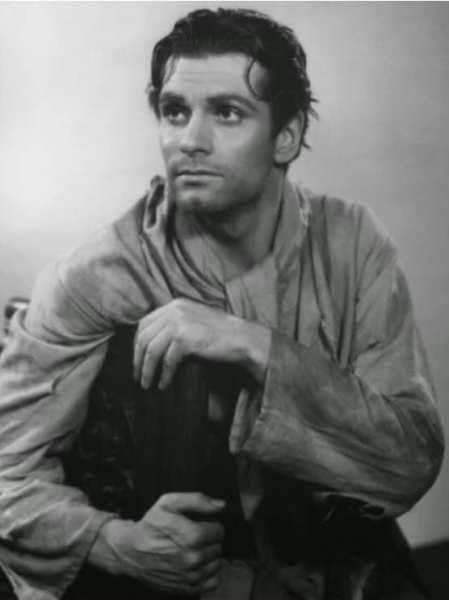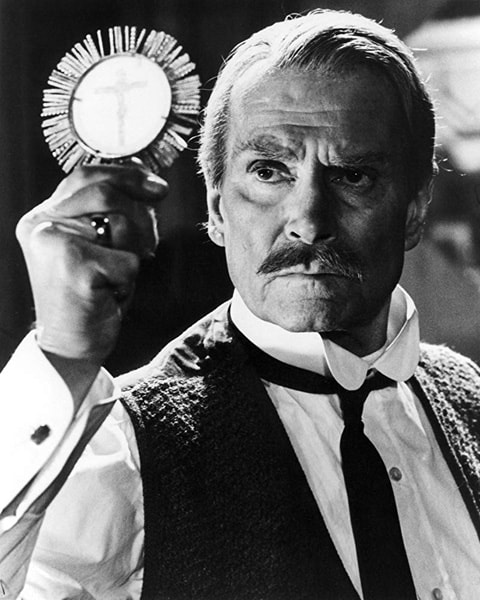
Often considered the greatest actor of his generation, renown for his Shakespearean work in theater and film, Laurence Olivier was quite a dashing young man when he first hit Hollywood. This made him ideal as a historical hero in a string of literary adaptions, even before he began directing Shakespeare on-screen. He was driven as an actor and continued to take even small roles until the end of his life when his body was wracked with illness. In between, he accomplished everything from a decade as the first artistic director of the UK’s National Theatre, four Academy Awards, two British Academy Film Awards, five Emmy Awards, three Golden Globe Awards, a knighthood in 1947 (the youngest actor to ever receive the honor), a life peer, and three marriages, including 20 tumultuous years with Vivien Leigh and his final years and three children with Joan Plowright.
Olivier famously disdained ‘method acting,’ and instead preferred the illusion of makeup and costume to help him create characters. He once said: “I can never act as myself, I have to have a pillow up my jumper, a false nose or a moustache or wig … I cannot come on looking like me and be someone else.” Seems Baron Olivier appreciated the costumer’s art as much as we do!
Orlando in As You Like It (1936)

Michael in Fire Over England (1937)

Heathcliff in Wuthering Heights (1939)

Mr. Darcy in Pride and Prejudice (1940)

Lord Horatio Nelson in That Hamilton Woman (1941)

King Henry V of England in Henry V (1944)

Hamlet, Prince of Denmark in Hamlet (1948)

Captain MacHeath in The Beggar’s Opera (1953)

Richard III in Richard III (1955)

Gen. Burgoyne in The Devil’s Disciple (1959)
Crassus in Spartacus (1960)

Othello in Othello (1965)

The Mahdi in Khartoum (1966)

Field-Marshal Sir John French in Oh! What a Lovely War (1969)

Air Chief Marshal Sir Hugh Dowding in Battle of Britain (1969)

Mr. Creakle in David Copperfield (1970)

Count Witte in Nicholas and Alexandra (1971)
Duke of Wellington in Lady Caroline Lamb (1972)

Sir Arthur Glanville-Jones in Love Among the Ruins (1975)

Professor James Moriarty in The Seven-Per-Cent Solution (1976)
Prof. Abraham Van Helsing in Dracula (1979)

Lord Marchmain in Brideshead Revisited (1981)

King Lear in King Lear (1983)

Admiral Hood in The Bounty (1984)
Gaius in The Last Days of Pompeii (1984)
King William III of Orange in Peter the Great (1986)

What’s your favorite historical costume movie or TV role of Laurence Olivier’s?














Seen less than half the list. Best memory is of “Hamlet,” which was the first one I saw.
I have two favourites and both are from his late period: Love Among the Ruins and Brideshead
I think Henry V might be the only one of these I’ve seen – I have a lot of catching up to do!
Lots I haven’t seen! Hmm. His very theatrical style wasn’t really my thing when I saw I think it was Hamlet. Looks/role wise, his later work seems more interesting (and I think he aged pretty well).
Ooh, my fave is “The Divorce of Lady X”, with the lovely Merle Oberon. Lots of near slapstick, and Merle Oberon wears a version of the Sargent “Madame X” dress. Also, costume ball!
Funny because Vivien Leigh was a master of acting for the camera.
I’ve seen so many of these and it would be hard to pick a favorite. However, I was surprised by The Beggar’s Opera and Olivier singing. I loved that.
Am also a Beggar’s Opera fan. Always good to see a great actor having fun on screen.
Huge Beggar’s Opera fan. Also really liked his Lear, which one could see how he’d grown into the role over the course of his career.
I LOVED the 1940 Pride and Prejudice. It was my first real intro to the story.
Which is funny, as when I got my hands on the book, I found out that so much was changed for the movie I was shocked.
Ok, but WHAT are they wearing in Henry V?!
The framing conceit of this production is that it starts off in Shakespeare’s Globe, as in this still, with a performance of their new play ‘King Henry the Fift’ (there’s actually a non-speaking part for Shakespeare, who is sitting at the side of the stage as prompter). We see the first couple of scenes played by an Elizabethan company, then it fades into the “real” 15th century. The same actors are still playing the same characters, except they’re no longer wearing stage make-up and trunk-hose. And the “real 15th century” is partly real gritty countryside and partly overtly stylised decor lifted straight from the illuminations in the Tres Riches Heures du Duc de Berry. (Incidentally, Shakespeare name-checked the Duke of Berry in one scene, and in the production we see a glimpse of him then – a fantabulously well-dressed grandee, delicately working on an illuminated page of parchment; a great in-joke.)
It’s a brilliant and witty concept and works wonderfully well. It has been very influential too; it’s my bet that it was the (very well researched and built) Globe Theatre in this movie that made Sam Wanamaker want to rebuild it for real and put on authentic productions in it. And ‘Shakespeare in Love’ is jam-packed with shout-outs to it.
Excellent, thank you! I shall try to watch it sometime soon
Two things:
That’s not Olivier as John French in ‘Oh What a Lovely War’ – it’s John Mills as douglas Haig.
I think you’re being a bit unfair about the blackface in ‘Othello’ and ‘Khartoum’, particularly ‘Othello’. In the 1960s it still wasn’t unusual, or seen as wrong, to black up white actors to play black roles. Particularly in Britain, where there really were virtually no classically-trained black actors to play them: nor could there have been, because the black population of Britain was tiny until the postwar West Indian immigration began in 1948. In 1965 British films were still routinely cast with stage actors who had learned their trade in repertory; and the first generation of British-born Afro-Caribbeans had barely yet left school. (When the RSC decided to cast a black Othello in 1959, they had to bring in Paul Robeson as guest star.) Times really were different back then, and it’s never fair to judge people of more than half a century ago and another country for not having your values. NB that the New York Times and other American commentators may have objected to Olivier’s blackface, but then the USA did have a long-established black population and a tradition of black actors. Britain hadn’t.
Even 20 years later in 1984 David Lean still thought it OK to have Alec Guinness brown up in ‘A Passage to India’, though by now there were objections to this on its release; by that time there really were black and brown actors around in Britain, and people were a bit more sensitive to the issues generally.
Also, the 1964 ‘Othello’ was a straight-up filmed version of the National Theatre Company’s hugely acclaimed stage production. All the cast were regular members of the company. It wasn’t a question of ‘shall we cast Olivier in our movie’? but ‘shall we capture this production for a wider audience and posterity?’
Olivier always saw the job of acting as being to embody and portray a character who is not you and whose experiences are not yours, and regularly used make-up and costume as a means to step into someone else’s skin: to the extent that he always said he really couldn’t act without it. Yes, he ‘went for it’ – he spent two-and-a-half hours in make-up every performance, and six months of voice-coaching to lower his voice by an octave, all to try to embody the role of a man who has been a prince, kidnap victim, then a slave (BTW, that lead-heavy chain-link necklace was certainly no accident) and now is a general in a foreign country, feted as a hero but still considered as an alien who you wouldn’t let your daughter marry.
Okay, nobody would do it now. Nor, for that matter, would anyone use Olivier’s hugely mannered speaking and acting style. But it is only fair to judge his performance by its own lights.
Here is an interesting article about black and Asian performances in Britain (1940-1969).
And thanks, ctrent29, for the V&A piece.
“Times really were different back then, and it’s never fair to judge people of more than half a century ago and another country for not having your values.” Thanks, Aleko; you make good points.
What an incredibly silly & shallow idea that just because something ‘used to be done that way’ means we can’t or shouldn’t judge it by today’s standards.
Even Disney Plus today puts a disclaimer on movies like ‘Dumbo,’ made in 1941, where the crows are black southern stereotypes & one’s even named Jim Crow. This cartoon movie & others have this label: “This program is presented as originally created. It may contain outdated cultural depictions.”
And if you think about it, what that disclaimer essentially means is ‘We wouldn’t make this movie this way now, but in 1941 we, along with a very large slice of the American (and overseas) public thought these cultural depictions normal. And we think that by its own lights and the mores of its own time it was a good movie, so instead of burying it and never letting it be seen again we’re putting it out there, and warning people who aren’t capable of dealing with artworks from another time or place who had attitudes at variance from their own not to watch it’.
But actually I didn’t say that we can’t or shouldn’t judge the customs and conventions of another age by our own standards: we have every right to say that such-and-such custom was terrible. What I said is that it’s unfair and unreasonable to blame individuals of that age for not being prescient enough to be and think just like us.
Regarding his role in SPARTACUS, it’s famous partly for Olivier’s casting as a slave owner in ancient Rome who makes it clear to young Tony Curtis exactly what his duties would be. This kind of more-or-less overt discussion of same sex issues was controversial for its time.
I’ve seen almost all of these and he still ranks up there as one of my fave romantic screen heroes.
Oysters or snails!
It is a rather memorable scene.
Vivien Leigh was offered the role of Isabella Linton.
Interesting still from ‘Wuthering Heights’. I wonder if it was just for publicity or a scene from the ball that got cut. Can’t imagine why Isabella would be on the floor at that point in the story. They’re clearly at Edgar’s home.
My favorite Dracula too. Did you notice that a full-color version is now available on the Collector’s Edition? I watched it and… damn, I didn’t even know this movie was set in the autumn in the desaturated version. SO PRETTY.
None of the above. I adore him in Rebecca, though!
Rebecca will always my favorite role of his, although I enjoyed Wuthering Heights and Pride & Prejudice is an interesting artifact (Olivier is a fine Darcy). I still need to see his major Shakespeare performances!
He made a perfect Zeus in Clash of the Titans.